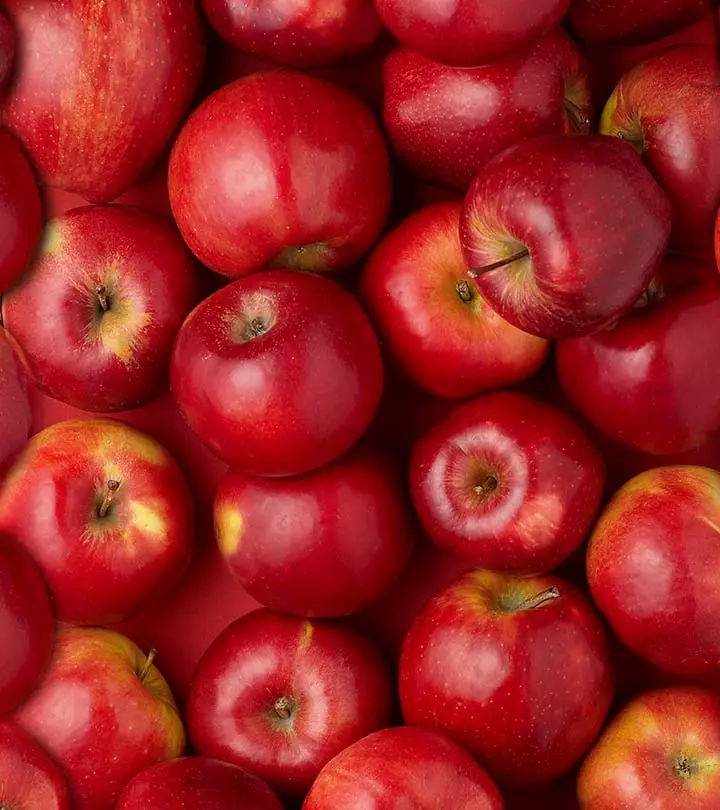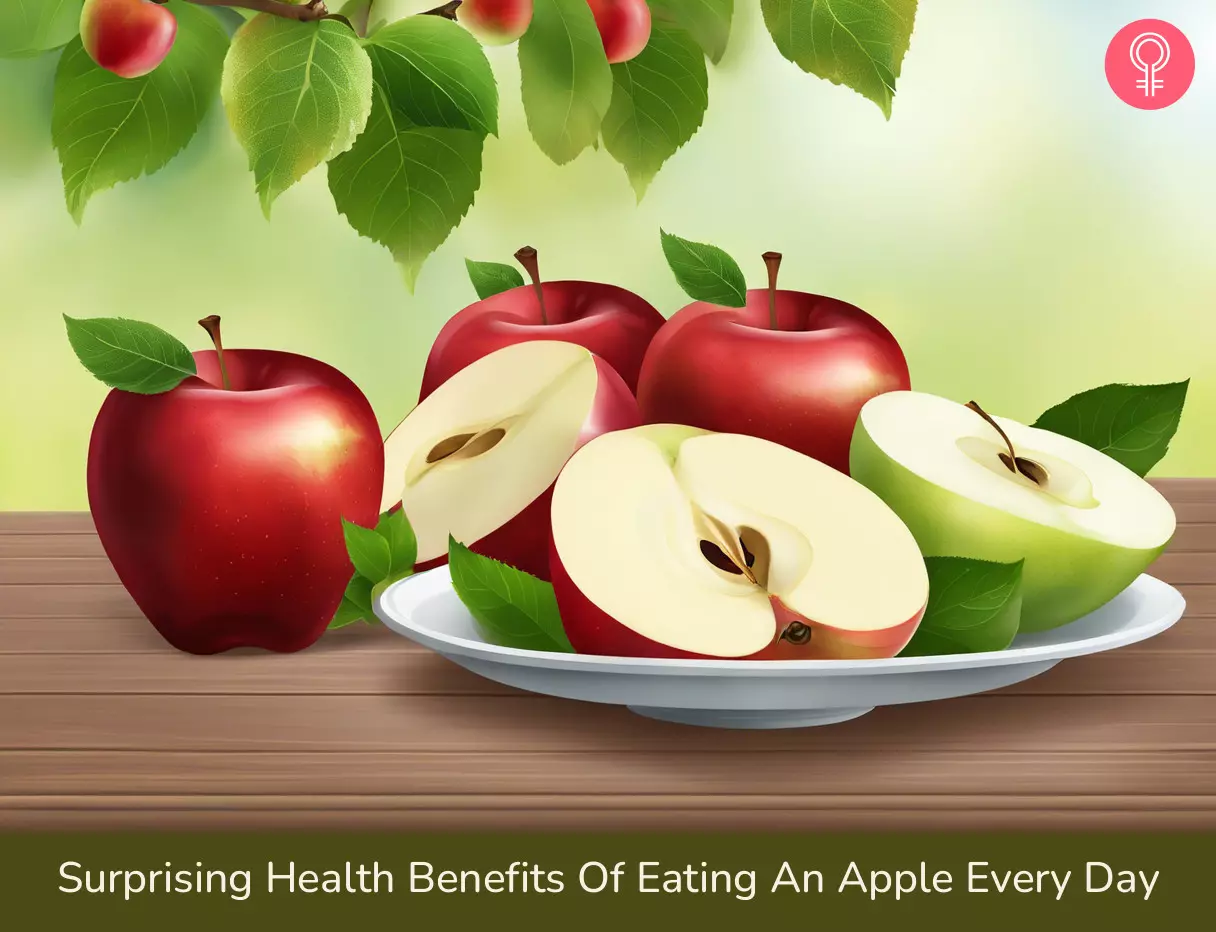Health Benefits Of Apples: 12 Powerful Reasons To Get Healthier
Give your diet and your overall health a helpful boost with this nutritious fruit.

Image: Shutterstock
Apples are one of the nutritionally dense fruits available. The benefits of apples are mainly due to the powerful antioxidants, vitamins, minerals, and dietary fibers. Consuming apples may reduce the risk of chronic diseases of the heart, brain, gastrointestinal systemi It includes organs of the digestive tract that take in food and liquids and break them down into energy for growth and tissue repair. , bones, and eyes.

This article discusses the benefits of eating apples, their nutritional profile, recommended dosage, and potential risks. Read on.
 Know Your Ingredient: Apple
Know Your Ingredient: AppleWhat Is It?
An edible sweet/tart round fruit with green or red skin and whitish flesh inside.
What Are Its Benefits?
An apple helps protect your heart, and your brain from neurodegenerative diseases, reduces acne and signs of aging, and aids weight loss.
Who Can Consume It?
Everyone can eat apples
How Often?
2 to 3 small apples or 1 large apple a day
Caution
Individuals who are fructose intolerant are advised to not eat apples.
In This Article
Why Should You Eat Apples? What Do They Contain?
Apple (Malus domestica) is one of the top three fruits produced around the world. It is easy to store and transport and available almost round the year (1).
 Trivia
TriviaThis fruit is rich in carbohydrates, fiber, vitamins, and phytochemicalsi They are characterized as bioactive nutritional plant compounds found in fruits, vegetables, and grains. . Its polyphenols have excellent antioxidant capacity (2).
As per research and medical literature, apples are among the foods that show direct and strongest associations with decreased mortality. In fact, the National Research Council recommends at least 5 servings of fruits and veggies a day, and apples are one of them (2).
Apples predominantly contain pectin and quercetin. Pectin is a type of soluble fiber that may help ease digestion. Quercetin is a flavonoid that has antioxidant and anti-inflammatory effects (1).
All these reasons are behind the famous proverb: An apple a day keeps the doctor away.
Move on to the next section to understand how apples benefit your health. You can also find supporting scientific evidence for each of the benefits. Scroll down!
Key Takeaways
- Apples contain high fiber, which helps improve digestion and lose weight
- They also lower cholesterol levels and promote gut health.
- You can consume 2 to 3 small apples or 1 medium apple every day.
- Apples may cause bloating and diarrhea in people with fructose intolerance.
What Are The Health Benefits Of Apples?
These crunchy fruits have potent anti-aging effects. They may prevent age-related memory loss, skin troubles, and hair fall. Eating them in the right amounts may also reduce the risk of cancers.
1. May Protect Your Heart

A few studies relate high flavonoid intake to a reduced risk of cardiovascular diseases of about 35%, particularly in women. Finnish research shows a similar relation between thrombotic strokei Occurs due to the formation of blood clots in the arteries carrying blood to the brain. Usually seen in people with high cholesterol. and apple consumption (2).
In older men and nearly 35,000 women, apples and wine (and not juice) prevented coronary heart disease, myocardial infarction (heart attack), and death. According to animal studies, the active ingredients in the peel and fruit have a cholesterol-lowering effect (1), (2).
They protect the heart and blood vessels from free radical damage that triggers most of the cardiovascular diseases. However, a significant chunk of evidence indicates mixed results of apple intake and heart health. Some researchers claim the data to be statistically insignificant (1), (2).
2. May Maintain Brain Health
Apple polyphenols may protect your brain from neurodegenerative diseases like Alzheimer’s and Parkinson’s and age-related memory loss. Lab studies at Cornell University propose quercetin and phenolic acids to be primarily involved in this property (3).
Apple juice concentrate rectifies folate deficiency that could cause age-related neurodegeneration. It reduces the accumulation of proteins (like amyloid-beta) that trigger Alzheimer’s disease and improves brain function (4).
It also eliminates free radicals, thereby slowing down cognitive decline. The extract maintains the levels of the neurotransmitter acetylcholine, which is low in deficient and aged subjects (5).
3. May Reduce Acne And Treat Aging Skin

Flavonoids like phlorizin, apigenin, silymarin, and genistein naturally occur in fruits like apple, cherry, and pear. Phlorizin has been extensively studied for its anti-aging effects on the skin (6).
Apigenin, genistein, and other polyphenols protect your skin from the sun and the UV ray-induced inflammation and dark/white spots. They also control the secretion of sebum and hence can help in managing acne vulgarisi Skin disease that develops when oil and dead skin cells clog hair follicles. Symptoms include blackheads, pus-filled pimples, or red bumps. (7).
One cup of raw apple slices (with skin) has about 5 mg of vitamin C. This vitamin rejuvenates your skin with its antioxidant effects and may improve skin health.. Therefore, topical and oral use of vitamin C-rich apples hydrates your skin and may prevent skin cancers (6), (8).
4. May Aid Weight Loss
A cup of apple slices (with skin) has 2.6 g of dietary fiber. Fiber slows down digestion, inducing a sense of satiety (fullness). According to studies, having more fiber-rich foods like apples is associated with the least amount of weight gain over time (1), (8).
Moreover, the glycemic index of raw apple and apple juice is about 36 (±2) and 41 (±2), respectively. Both these foods produce fewer and smaller spikes in blood sugar levels. This may lessen hunger pangs and prevent overeating. Thus, your weight gain would be in check (1), (9).
But how long should one consume apples to reduce body fat is still not clear (10).
Jade, a YouTube blogger, tried a 5-day apple diet for weight loss and shared her results in a video. She said, ” I lost you know a little bit of weight, feel a little leaner but someone else might have completely different results from doing this (i)”.
5. May Regulate Diabetes

An epidemiological study of about 38,000 women spanning over 9 years showed a positive relation between apple intake and type 2 diabetes. Those who ate 1-2 apples a day had 28% lower risk of type 2 diabetes compared to those who ate none (1).
The apple flavonoids could be responsible for this, given their antioxidant effects. These active ingredients protect the cells in the pancreas from damage (1).
Despite having 15% carbohydrates, apples have a relatively low glycemic index. You may add them to a diabetic-friendly diet (1). However, consult your doctor as they would know what’s best for you.
6. May Promote Digestion And Gut Health
Apples are rich in polyphenols, carbohydrates, and fiber. A major proportion of the polyphenols and fiber directly reach the colon. They are fermented by the good gut bacteria that survive on the derived energy (11).
The insoluble fiber of apples, especially the pectin and hemicellulose, are converted to short-chain fatty acids (SCFAs). SCFAs, in turn, promote the growth of intestinal microbes. They also maintain the ratio between the two important classes of gut bacteria, Firmicutes and Bacteroidetes (11).
The fiber doubles up as a bulking agent. It holds/retains water to cleanse and rectify the bowel movement (12).
7. Have Anti-inflammatory Properties
Chronic inflammation is linked to diabetes, cardiovascular disease, irritable bowel disease (IBD), Alzheimer’s, arthritis, asthma, Crohn’s diseasei It causes swelling of the tissues in the digestive tract, leading to abdominal pain, diarrhea, weight loss, anemia, and fatigue. , etc. You can control the severity of such inflammatory diseases by adding apples to your diet (13), (14).
Raw, unpeeled apples contain polyphenols that inhibit the production of pro-inflammatoryi Substances that encourage inflammation or have the ability to trigger inflammation. For instance, air pollution. compounds. Apple juice may possess flavonoid derivatives like procyanidin and phloretin. These active molecules can bring down the expression of genes responsible for inflammation (14), (15).
8. May Boost Eye Health And Vision
Vitamins A and C and quercetin protect your eyes from age-related degeneration and other eye infections. Carotenoids like lutein and zeaxanthin are vital for color detection in the retina. They are potent antioxidants too. Consuming foods rich in these components is the only way to maintain their levels in the macula of the retina (16).
Red apples with skin are abundant in almost all of these micronutrients. They have 15 μg/100 g of lutein, 18 μg/100 g of ß-carotene, 54 IU/100 g of vitamin-A, and 4.6 mg/100 g of vitamin-C. Studies have proven the therapeutic effects of having these fruits on eye disorders like cataracts and macular degenerationi Breakdown of the layers of the macula (part of the eye which provides clear vision), resulting in hazy or diminished central vision. in the elderly (8), (17).
9. May Be Good For Bones And Teeth
Apples are great sources of minerals. They contain boron, potassium, calcium, and fair amounts of zinc, and these are necessary for bone health (18).
Pears, apples, prunes, berries, tomatoes, etc. should be a mandatory addition to the diet of post-menopausal women (and older men). The antioxidants in these fruits can prevent/delay osteoarthritis, osteoporosis, and other bone diseases (18).
While sugary apple juice may contribute to tooth decay, fresh apples are less likely to cause such problems. These fibrous fruits increase salivation and neutralize the acidic environment in your mouth. Chewing on them also lessens cavities (19).
10. May Help Treat Asthma
A study published in the Nutritional Journal found that the consumption of apples was associated with a reduced incidence of asthma in 10,000 Finnish men and women. The presence of flavonoids, like quercetin, hesperetin, and naringenin, in apples may help reduce the risk of asthma (2). Also, anecdotal evidence suggests that the antioxidants and phytochemicals in apples may help reduce inflammation and swelling in the lungs. This, in turn, may benefit people with asthma since this condition is characterized by inflammation and narrowing of the airways. However, more studies are warranted to better understand this specific benefit of apples.
11. May Promote Hair Growth

Annurca apple, native to Southern Italy, contains a polyphenol called Procyanidin B2 in abundance. Procyanidin B2 has been studied extensively for its effect on hair growth. It is said to stimulate the proliferation of hair follicles and keratin production (20), (21).
Healthy subjects were given a fixed oral dose of Annurca apple extract in a study. After two months, they showed increased hair growth, hair number, hair weight, and keratin content (20).
Apple cider vinegar is widely used in hair care products to prevent hair fall and dandruff. However, there isn’t enough research supporting this property.
12. May Reduce Cancer Risk
Clinical trials suggest that consuming apples reduce the risk of cancer. High consumption of apples may reduce the risk of lung, colorectal, and GI tract cancers. Some animal studies demonstrate the anti-cancer effect of this fruit on breast cancer cells (22), (23), (24).
Apple flavonoids have the second highest level of antioxidant power among all fruits. Their peels have a stronger antioxidant capacity than the flesh and may help in cancer prevention (23).
These antioxidants scavenge free radicals that damage healthy cells and DNA. They also stop the production of these reactive/toxic substances. That is why the tumor incidence in the subjects was reduced by 17% when they had one apple a day for over 24 weeks (24).
In addition, the antioxidants in apples may also help improve immune system function (25).
Check out the next section for a complete list of nutrients in apples.
Nutrition Profile Of Apples
| APPLE, raw | |
|---|---|
| Serving size | 1 medium (3″ dia) or 182 g |
| Nutrient | Amount per serving |
| Proximates | |
| Energy (kcal) | 95 |
| Protein (g) | 0.47 |
| Fat, total (g) | 0.31 |
| Carbohydrate (g) | 25.13 |
| Sugars, total (g) | 18.91 |
| Fiber, total dietary (g) | 4.4 |
| Cholesterol (mg) | 0 |
| Minerals | |
| Calcium (mg) | 11 |
| Copper (mg) | 0.049 |
| Iron (mg) | 0.22 |
| Magnesium (mg) | 9 |
| Phosphorus (mg) | 20 |
| Potassium (mg) | 195 |
| Sodium (mg) | 2 |
| Zinc (mg) | 0.07 |
| Vitamins | |
| Vitamin A, RAE (mcg) | 5 |
| Vitamin C (mg) | 8.4 |
| Vitamin B-6 (mg) | 0.075 |
| Choline, total (mg) | 6.2 |
| Vitamin E, alpha tocopherol (mg) | 0.33 |
| Folate, DFE (mcg) | 5 |
| Folate, food (mcg) | 5 |
| Folate, total (mcg) | 5 |
| Vitamin K (mcg) | 4 |
| Niacin (mg) | 0.166 |
| Riboflavin (mg) | 0.047 |
| Thiamin (mg) | 0.031 |
| Carotene, beta (mcg) | 49 |
| Cryptoxanthin, beta (mcg) | 20 |
| Lutein + zeaxanthin (mcg) | 53 |
Apples are one of the richest fruits in terms of phytochemical composition. They contain significant amounts of flavonoids and phenolic acids (2).
Some of the most-studied compounds include quercetin derivatives, catechin, epicatechin, procyanidin, cyanidin, coumaric acid, chlorogenic acid, gallic acid, and phloridzin (2).
Apple peel has procyanidins, catechin, epicatechin, chlorogenic acid, phloridzin, and quercetin. Quercetin derivatives are found exclusively in the skin (2).
In the flesh, catechin, procyanidin, epicatechin, and phloridzin are present in fair amounts. But chlorogenic acid tends to be higher in the flesh than in the peel (2).
Research showed that apples without the peels had less antioxidant activity than apples with the peels. So, make eating apples a habit. They can repair and maintain almost every organ system of your body.
Now, for the most important question:
How Many Apples Should You Eat In A Day?
The fruit recommendation for children is age and gender-dependent. It lies between 1.5-2 cups for most children over 4 years.
For young adults and above, the Dietary Reference Intakes (DRI) for fiber is set to 25-30 g/day. Apples (with skin) contain a mix of insoluble (3.1 g/1 medium apple) and soluble (1.3 g/1 medium apple) fiber.
Considering fiber intake from other sources like vegetables, juices, and meat, eating 2-3 small-sized apples or 1 medium-large sized apple a day seems ideal.
How About The Pesticides On The Peel?
Eating an apple with its skin is recommended. But it is shown to have deposits of harmful pesticides. Does that mean you peel the fruit?
Not necessarily.
Many countries have taken strict action against this. There are various pretreatment measures the farmers and the government have to consider before releasing a batch of apples into the markets.
Moreover, you can follow these tips to get rid of pesticides on apples:
- Buy only organic produce.
- While washing, brush the surface of the fruits with a clean food-grade brush.
- Do not use detergents or soap. Washing is primarily meant to kill the bacteria.
- Water is just as, if not more, effective than any produce wash.
- Baking soda can be used. Soak the apple in a baking soda solution of 1 teaspoon of baking soda and 2 cups water for 10-15 minutes. Rinse well. Towel dry the fruits.
- You can pretreat a big batch of apples before storing them.
What Is The Best Way To Have Apples?
You can find a thousand apple products on the market. More than 50% contain just of the synthetic flavor/essence. Coming to the actual apple-based products, you can choose between the whole-fresh fruit, apple juice, apple sauce, pies, and many more.
 Quick Tip
Quick TipHowever, the best way to tap all the benefits of apples is by eating fresh, whole fruits (along with the skin). Whole fruits have maximum nutrients and almost no contamination (26)
100% apple juice is another option you could go for. But several studies link its consumption to obesity and stunted growth in children. So, even if consumed in excess, apple juice does not help meet the nutritional requirement or health benefits (26).
To enjoy all the apple benefits for the skin, you can also apply apple juice or mashed flesh to your skin. Mix one tablespoon of apple juice and honey in two tablespoons of milk. Massage into your face and neck. Wash it off with warm water for supple and glowing skin.
These packs are great for removing blackheads and blemishes. They may help open the dust and oil-clogged skin pores too.
But, before you go on an apple indulgence spree, we recommend you to read the following section carefully.
Does Eating Apples Have Side Effects?

- If you are fructosei Fructose is a simple sugar found in fruit juices and honey. It is also referred to as fruit sugar. intolerant, apples may cause bloating. You may also have diarrhea, nausea, and discomfort.
- Also, if you are allergic to plums, pears, apricots, and any Rosaceae member, you should avoid apples.
- Apples are possibly safe for pregnant and nursing women. However, there is insufficient evidence proving this point.
- Drug interactions with apples have also not been well-studied or characterized.
There is less research on these side effects. Hence, consult your doctor/nutritionist for a suitable dosage and the way of intake.
Infographic: 5 Amazing Reasons For Eating Apples
Apples not only taste delicious on their own but are also used in pies, oatmeal, and smoothies to add an element of tartness and sweetness. However, they have a lot more to offer than their wonderful taste. Apples are rich in fiber, antioxidants, and vitamins, which may improve your overall health and well-being. Check out the infographic below to know more.

Illustration: StyleCraze Design Team
Apples are nutrient-dense fruits with excellent antioxidant and anti-inflammatory properties. They are also rich in fiber and phytochemical compounds. Intake of apples may protect your heart, maintain brain health, reduce acne, treat aging skin, aid in weight loss, and regulate blood glucose levels. However, excess consumption may cause side effects like bloating, diarrhea, and discomfort. In addition, people who are allergic to plums, pears, or apricots should avoid eating apples. To reap the numerous benefits of apples, try adding them to your breakfast cereal, blending them into smoothies, or enjoying them as a crisp, refreshing snack. Their versatility makes it simple to incorporate them into meals and snacks throughout the day. Consuming them in moderation can give you long-term benefits.
Frequently Asked Questions
How to keep apples stored fresh for long?
For prolonged freshness, store the apples in the crisper drawer of the refrigerator. They will usually remain fresh for at least one month.
Apples continue to ripen after harvesting by releasing ethylene (a gas). Refrigeration will slow the release and ripening. You would still find trace amounts of ethylene being produced, which ripens other apples stored nearby.
Hence, store them in separate crates/trays, far from one another or any other fruit, for best results.
What is the best time to eat an apple?
It is recommended to have an apple either one hour after breakfast or one hour after lunch.
Can I eat an apple on an empty stomach?
According to Ayurveda, eating an apple on an empty stomach is not recommended due to its high fiber value. Thus, having it early in the morning may cause bloating. However, there is not enough scientific research to prove the same.
Can I drink water after eating an apple?
In general, drinking water immediately after eating any fruit is not recommended. The intake of water an hour after eating fruit is said to help in diluting gastric juices and aiding digestion.
Illustration: Surprising Health Benefits Of Eating An Apple Every Day

Image: Stable Diffusion/StyleCraze Design Team
References
Articles on StyleCraze are backed by verified information from peer-reviewed and academic research papers, reputed organizations, research institutions, and medical associations to ensure accuracy and relevance. Read our editorial policy to learn more.
- Apples, The Nutrition Source, Harvard T.H.Chan School Of Public Health.
https://nutritionsource.hsph.harvard.edu/food-features/apples/ - Apple phytochemicals and their health benefits, Nutrition Journal, US National Library of Medicine, National Institutes of Health.
https://www.ncbi.nlm.nih.gov/pmc/articles/PMC442131/ - An apple a day could help protect against brain-cell damage that triggers Alzheimer’s, Parkinsonism, Cornell studies find, Cornell Chronicle, Cornell University.
https://news.cornell.edu/stories/2004/11/apple-day-could-protect-against-brain-cell-damage - Dietary supplementation with apple juice decreases endogenous amyloid-beta levels in murine brain, Journal of Alzheimer’s disease, US National Library of Medicine, National Institutes of Health.
https://pubmed.ncbi.nlm.nih.gov/19158432/ - Apple juice concentrate maintains acetylcholine levels following dietary compromise, Journal of Alzheimer’s disease, US National Library of Medicine, National Institutes of Health.
https://pubmed.ncbi.nlm.nih.gov/16914839/ - Discovering the link between nutrition and skin aging, Dermato Endocrinology, US National Library of Medicine, National Institutes of Health.
https://www.ncbi.nlm.nih.gov/pmc/articles/PMC3583891/ - Polyphenol-rich apple extract inhibits dexamethasone-induced sebaceous lipids production by regulating SREBP1 expression, Experimental Dermatology, US National Library of Medicine, National Institutes of Health.
https://pubmed.ncbi.nlm.nih.gov/28191675/ - Apples, raw, with skin (Includes foods for USDA’s Food Distribution Program), National Nutrient Database for Standard Reference Legacy Release, Agricultural Research Service, United States Department of Agriculture.
https://fdc.nal.usda.gov/food-details/171688/nutrients - Glycemic index for 60+ foods, Harvard Health Publishing, Harvard Medical School.
https://www.health.harvard.edu/diseases-and-conditions/glycemic-index-and-glycemic-load-for-100-foods - Weight Loss Associated With Consumption of Apples: A Review, Journal of the American College of Nutrition, US National Library of Medicine, National Institutes of Health.
https://pubmed.ncbi.nlm.nih.gov/29630462/ - Effects of Commercial Apple Varieties on Human Gut Microbiota Composition and Metabolic Output Using an In Vitro Colonic Model, Nutrients, US National Library of Medicine, National Institutes of Health.
https://www.ncbi.nlm.nih.gov/pmc/articles/PMC5490512/ - Diets for Constipation
https://www.ncbi.nlm.nih.gov/pmc/articles/PMC4291444/ - Foods that fight inflammation, Harvard Women’s Health Watch, Harvard Health Publishing, Harvard Medical School.
https://www.health.harvard.edu/staying-healthy/foods-that-fight-inflammation - Apple peel polyphenols: a key player in the prevention and treatment of experimental inflammatory bowel disease, Clinical Science (London, England):1979, US National Library of Medicine, National Institutes of Health.
https://pubmed.ncbi.nlm.nih.gov/27630205/ - Influence of apple polyphenols on inflammatory gene expression, Molecular Nutrition and Food Research, US National Library of Medicine, National Institutes of Health.
https://pubmed.ncbi.nlm.nih.gov/19764067/ - “Dietary Sources of Lutein and Zeaxanthin Carotenoids and Their Role in Eye Health”, nutrients, US National Library of Medicine.
https://www.ncbi.nlm.nih.gov/pmc/articles/PMC3705341/ - Vegetables and Fruits, the Nutrition Source, Harvard T.H.Chan School Of Public Health.
https://nutritionsource.hsph.harvard.edu/what-should-you-eat/vegetables-and-fruits/ - Nourish Your Bones, Food and Nutrition, Publications, North Dakota State University.
https://www.ndsu.edu/agriculture/extension/publications/nourish-your-bones - The Best Foods For A Healthy Smile and Whole Body, College of Dentistry, University of Illinois at Chicago.
https://dentistry.uic.edu/news-stories/the-best-foods-for-a-healthy-smile-and-whole-body/ - Annurca Apple Polyphenols Ignite Keratin Production in Hair Follicles by Inhibiting the Pentose Phosphate Pathway and Amino Acid Oxidation, Nutrients, US National Library of Medicine, National Institutes of Health.
https://www.ncbi.nlm.nih.gov/pmc/articles/PMC6213762/ - Procyanidin B-2, extracted from apples, promotes hair growth: a laboratory study, The British Journal of Dermatology, US National Library of Medicine, National Institutes of Health.
https://pubmed.ncbi.nlm.nih.gov/11841365/ - Apple intake and cancer risk: a systematic review and meta-analysis of observational studies, Public Health Nutrition, US National Library of Medicine, National Institutes of Health.
https://pubmed.ncbi.nlm.nih.gov/27000627/ - An apple a day may hold colorectal cancer at bay: recent evidence from a case-control study, Reviews on Environmental Health, US National Library of Medicine, National Institutes of Health.
https://pubmed.ncbi.nlm.nih.gov/19476292/ - Apples could help reduce the risk of breast cancer, study suggests, Cornell Chronicle, Cornell University.
https://news.cornell.edu/stories/2005/03/apples-could-help-reduce-risk-breast-cancer-study-suggests - A Polyphenol Enriched Variety of Apple Alters Circulating Immune Cell Gene Expression and Faecal Microbiota Composition in Healthy Adults: A Randomized Controlled Trial
https://www.ncbi.nlm.nih.gov/pmc/articles/PMC8065949/ - Consumption of various forms of apples is associated with a better nutrient intake and improved nutrient adequacy in diets of children: National Health and Nutrition Examination Survey 2003–2010, Food & Nutrition Research, US National Library of Medicine, National Institutes of Health.
https://www.ncbi.nlm.nih.gov/pmc/articles/PMC4595465/
Read full bio of Madhu Sharma
Read full bio of Swathi Handoo
Read full bio of Ravi Teja Tadimalla
Read full bio of Aparna Mallampalli



























Community Experiences
Join the conversation and become a part of our empowering community! Share your stories, experiences, and insights to connect with other beauty, lifestyle, and health enthusiasts.